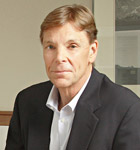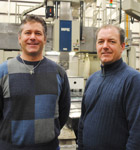Most financial advisers have two responsibilities: finding and retaining clients. In other words, they’re sales people and advice givers. It’s a model that’s worked for decades, but in 2006, one firm decided to rock the boat. “The best producers in terms of sales are usually not the best advice givers because they’re too busy generating business to focus on the client, so we asked, ‘Why are we combining those roles?’” says Marty Bicknell, founder and CEO of Leawood, Kansas-based Mariner Wealth Advisors.
Bicknell certainly had the experience to make that judgment call. He spent the first 16 years of his career as a financial adviser, working for A.G. Edwards & Sons, Inc., which was founded in 1887 when Albert Gallatin Edwards and his son opened for business in St. Louis. “It was run well by the Edwards family for 115 years, but in 2001, the first non-Edwards CEO tried to turn the firm into a traditional Wall Street brokerage,” Bicknell says. “For five years, I struggled to figure out how I fit into that model, and ultimately determined that I didn’t, so I cofounded a firm we could be proud of, bringing seven people with me.”
Bicknell’s timing was fortuitous: The financial crisis of 2008 and 2009 left many investors with severely diminished assets seeking new financial advisers, and Bicknell and his team were happy to show them how their business model was a better option. “Really, all we did was create an environment where the client comes first,” says Bicknell, noting that in order do so he fostered an entrepreneurial climate that attracted strong individuals. “It’s a concept we call unique ability … We let financial advisers come in and do what they do best, and we find someone else to do everything else.”
What do you like best about working at Mariner wealth advisors?
Brian Leitner
Senior Vice President of Wealth Management
“I am incredibly fortunate to work with professionals whose passion for helping others is as deep and committed as mine.”
Michael O’Neill
Senior Wealth Advisor
“Our roles are focused. Our technology is excellent. And, we have the best resources and support to help us deliver extra value to our clients.”
Jason McElwee
Senior Vice President of Business Development
“The culture here is unique and inspiring. We foster a spirit of community and philanthropy that is contagious.”
To that end, the firm currently has 40 financial advisers operating on three-person teams: a senior adviser, a junior adviser, and a client service administrator. They’re brought clients by a group of seven business development specialists, but left on their own to make decisions within certain parameters. Specifically, a five-person investment team sets target investment allocations, and financial advisers use their discretion within those guidelines. “As an example, our strategic investment team may set our large-cap growth allocation at 15 percent to 30 percent of a client’s portfolio, but an adviser can decide what fits his or her clients’ needs within that band,” Bicknell says. “Within that category, he or she can also choose from among three to seven investments, such as ETFs, mutual funds, and separate accounts. To help financial advisors make decisions, we offer all the resources you could imagine, including one dedicated trust and estate specialist, four attorneys, 15 certified public accountants, and 22 chartered financial analysts.”
Compensation, says Bicknell, is equally innovative, with business development officers compensated on sales and financial advisers compensated on retention. The firm also offers a comprehensive benefits package paid at 99 percent (and it would be 100 percent if tax laws allowed it).
Perhaps most unique, however, is the firm’s emphasis on charitable giving. An eight-employee board of directors oversees the Mariner Foundation, which supports a number of charitable organizations, including Habitat for Humanity and the Big Brothers Big Sisters program. Employees who wish to contribute to the foundation are offered payroll deduction with unlimited matching; they may also contribute their time at the expense of the firm. “We decided that our time is as important as our money, so the foundation’s board organizes quarterly
charity events, and we give employees one day of paid time off
per quarter to volunteer their time,” Bicknell says.
According to Bicknell, the result is a “really special” firm culture, which led the Kansas City Business Journal and Ingram‘s magazine to name the firm one of the best places to work in 2011. “We have a simple philosophy: We put the client first, employees second, and firm last,” he says. “But, by finding advisers who want to put client needs first, the second and third pieces just kind of happen.”

